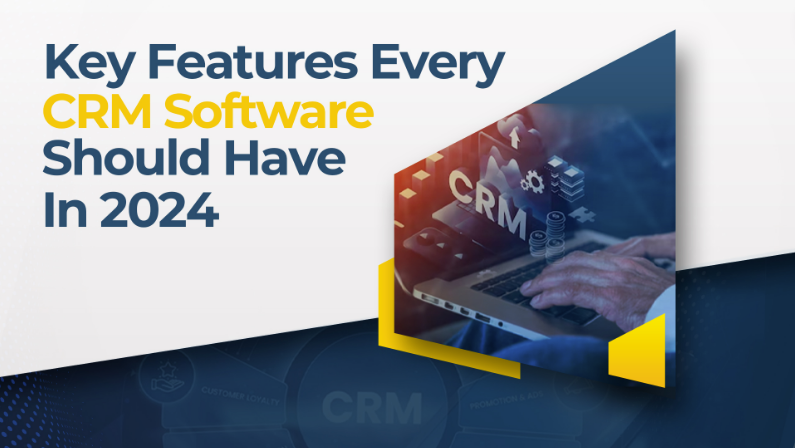In the fast-paced world of business, Customer Relationship Management (CRM) software stands as a cornerstone for organizations aiming to build lasting connections with their clientele. As we step into 2024, the landscape of CRM is evolving rapidly, driven by technological advancements and changing business needs. In this blog, we will delve into the key features that every CRM software should encompass to remain relevant and effective in the dynamic business environment of 2024.
1. User-Centric Interface and Experience (UX):
In the coming years, a seamless and intuitive user interface will be paramount for CRM software. Users should be able to navigate the system effortlessly, reducing the learning curve and ensuring widespread adoption across the organization. Personalization and customization options will play a pivotal role, allowing users to tailor the CRM interface to match their specific workflow preferences.
2. Artificial Intelligence (AI) Integration:
AI is not just a buzzword; it's a transformative force in CRM. In 2024, CRM systems should leverage AI for predictive analytics, lead scoring, and customer behavior analysis. Machine learning algorithms can enhance user insights, automate routine tasks, and provide intelligent recommendations, ultimately boosting efficiency and enabling more informed decision-making.
3. Omni-Channel Communication:
The modern customer interacts with businesses through various channels—email, social media, phone calls, and more. A robust CRM system in 2024 must seamlessly integrate and synchronize communications across all these channels. This ensures that no customer interaction goes unnoticed, and organizations can maintain a consistent and personalized communication strategy.
4. Blockchain Integration for Enhanced Security:
Security is a top concern for businesses handling sensitive customer data. Blockchain technology offers a decentralized and tamper-proof solution to enhance data security in CRM systems. Implementing blockchain can help prevent data breaches, ensure transparency in transactions, and build trust among users by providing an immutable record of interactions.
5. Advanced Analytics and Reporting:
Beyond basic reporting, the CRM of the future should offer advanced analytics capabilities. This includes real-time reporting, customizable dashboards, and the ability to generate predictive insights. Comprehensive analytics empower businesses to understand customer trends, measure the success of marketing campaigns, and make data-driven decisions to stay ahead of the competition.
6. Integration with Collaboration Tools:
Collaboration is key in today's interconnected business landscape. A CRM system should seamlessly integrate with popular collaboration tools such as Slack, Microsoft Teams, or project management platforms. This ensures that teams can work cohesively, share information effortlessly, and streamline communication for better customer service and internal coordination.
7. IoT (Internet of Things) Connectivity:
As IoT continues to proliferate, CRM systems should be ready to harness the power of connected devices. Integrating IoT data into CRM allows businesses to gather real-time insights, track product usage, and proactively address customer needs. This connectivity enhances the overall customer experience by providing a deeper understanding of product usage patterns.
8. Mobile-First Approach:
In the mobile-centric world of 2024, CRM systems should prioritize a mobile-first approach. Mobile CRM applications should offer a seamless experience, with features like offline access, responsive design, and push notifications. This ensures that sales representatives and field personnel can access crucial information on the go, enhancing productivity and responsiveness.
9. GDPR and Data Privacy Compliance:
With an increasing focus on data privacy, CRM systems must be designed with compliance in mind. In 2024, adherence to regulations such as GDPR is non-negotiable. Robust data encryption, user consent management, and features that facilitate compliance reporting will be integral to winning the trust of customers and avoiding legal repercussions.
10. Scalability and Flexibility:
The business landscape is dynamic, and CRM systems must be able to adapt. Scalability ensures that the software can grow with the organization, accommodating a growing customer base and expanding data requirements. Flexibility is equally crucial, allowing organizations to customize the CRM system to meet their unique business processes and evolving needs.
Conclusion:
As we stand on the cusp of 2024, the expectations from CRM software have never been higher. Businesses are looking for solutions that not only streamline their processes but also anticipate and respond to the ever-changing demands of the market. By incorporating these key features—ranging from advanced technologies like AI and blockchain to fundamental aspects like user experience and scalability—CRM software developers can ensure their products are not just tools but strategic assets that empower businesses to build and nurture enduring customer relationships. Embracing these features will not only meet the current needs of businesses but also position CRM software as a catalyst for innovation and success in the years to come.















Post Comments